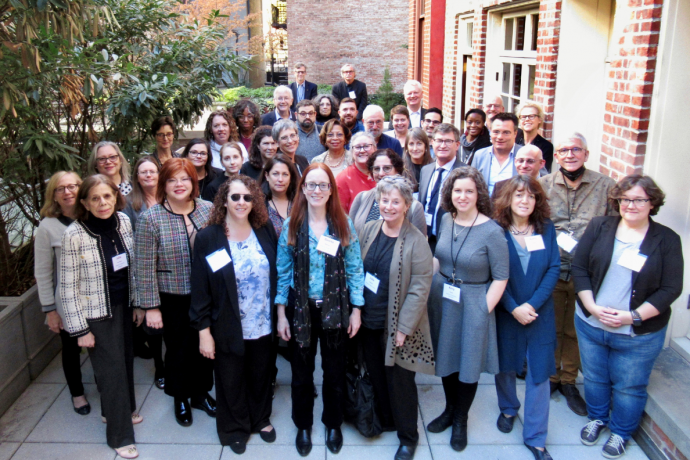ACLS Community Message for November 2022

Doing errands in the East Village last Saturday, I saw a woman stumble and fall on an uneven bit of sidewalk. In seconds I joined an older man, a woman about my age, and a young couple in matching Goth attire forming a circle around her. Other than needing a hand up and a moment to catch her breath, she was fine, but we hovered until she steadied herself, when we exchanged a collective nod and smile and went our ways.
Our little group only existed for a moment. But the speed at which we gathered and our repeated offers of help reminded me of the support the members of our Conference of Executive Officers – the directors of our 79 scholarly societies – provide to one another every day. That support helps fuel the directors’ work on behalf of their members: in total, tens of thousands of scholars and supporters of scholarship around the world. They rarely stumble – they are a highly professional group! – but at a time of continued unpredictability and challenge, they share problems and solutions, offer advice and patient ears.
We were delighted to host the Conference’s meeting in person here in New York City last week. Many times over those two days I wished I could transmit the conversation straight to the writers and tweeters on American academia who too often fall back on familiar story lines and simplistic binaries. At the Roosevelt House of Public Policy (thank you, Hunter College!) were serious discussions about academic freedom, access to knowledge, and the formation of equitable and just scholarly communities – and how the activities of each society could enrich the experience of their members in all these areas.
At the Roosevelt House of Public Policy were serious discussions about academic freedom, access to knowledge, and the formation of equitable and just scholarly communities – and how the activities of each society could enrich the experience of their members in all these areas.
The journal Public Books recently featured an essay by John Plotz about the late Hungarian political philosopher Agnes Heller. Plotz reflects on Heller’s ambivalence about intellectual schools and her choice, having been formed in her early years of study by the Lukacsian Budapest School, to strike out on her own. Heller’s critique of schools illuminates another valuable capacity of professional societies: they serve as the frame for scholarly affiliation and as a direction-setter of scholarly priorities without demanding epistemological allegiance or dictating method. While every society can improve, the directors, staff members, and board members work to resist clique-ish tendencies and to encourage an inclusive approach to membership and leadership (and the institutional recognition of service).
Public Books also recently celebrated the scholarly societies with an affectionate quiz, “Which academic organization are you?” I want to express my own appreciation for the societies and sincere thanks to their leadership and staff members. They help nourish us, like the leaves, air, and light the Manx poet Robert Corteen Carswell describes in his paean to late autumn.
Best wishes!
Joy
The Leaves of Autumn
by Robert Corteen Carswell
The leaves of Autumn were lying:
Half-earth they were now, that were coming to be
mixed with the rich soil which fed them
throughout their days, from their coming out,
and whilst they were sucking up nourishment,
and increasing the tree by the light of the sun.
And now they were thrown down, to feed
new leaves in the time to come.
One or two moved on the gentle wind.
I am bending down to put my head
against this ground, that attracts heads
and bodies enough, in the hope
that it feeds my very soul.

